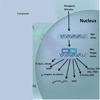c-Myc and cancer metabolism
- PMID: 23071356
- PMCID: PMC3505847
- DOI: 10.1158/1078-0432.CCR-12-0977
c-Myc and cancer metabolism
Abstract
The processes of cellular growth regulation and cellular metabolism are closely interrelated. The c-Myc oncogene is a "master regulator" which controls many aspects of both of these processes. The metabolic changes which occur in transformed cells, many of which are driven by c-Myc overexpression, are necessary to support the increased need for nucleic acids, proteins, and lipids necessary for rapid cellular proliferation. At the same time, c-Myc overexpression results in coordinated changes in level of expression of gene families which result in increased cellular proliferation. This interesting duality of c-Myc effects places it in the mainstream of transformational changes and gives it a very important role in regulating the "transformed phenotype." The effects induced by c-Myc can occur either as a "primary oncogene" which is activated by amplification or translocation or as a downstream effect of other activated oncogenes. In either case, it appears that c-Myc plays a central role in sustaining the changes which occur with transformation. Although efforts to use c-Myc as a therapeutic target have been quite frustrating, it appears that this may change in the next few years.
©2012 AACR
Conflict of interest statement
Dr. Miller is on the Board of Directors of Advanced Cancer Therapeutics; All other authors declare no potential conflict of interest.
Figures


References
-
- Meyer N, Penn LZ. Reflecting on 25 years with MYC. Nat Rev Cancer. 2008;8:976–990. - PubMed
-
- Lombardi L, Newcomb EW, Dalla-Favera R. Pathogenesis of Burkitt lymphoma: expression of an activated c-myc oncogene causes the tumorigenic conversion of EBV-infected human B lymphoblasts. Cell. 1987;49:161–170. - PubMed
Publication types
MeSH terms
Substances
Grants and funding
LinkOut - more resources
Full Text Sources
Other Literature Sources

